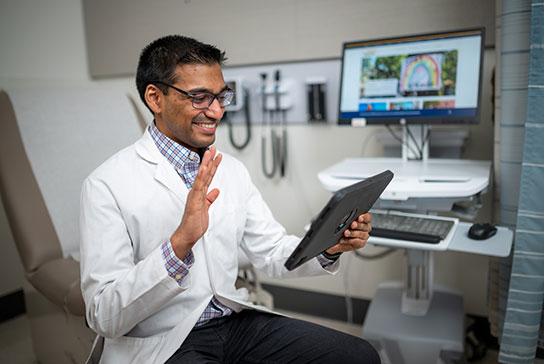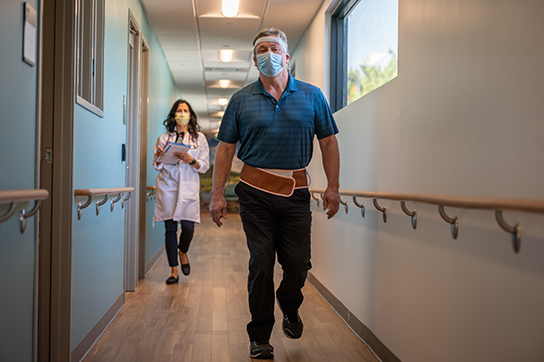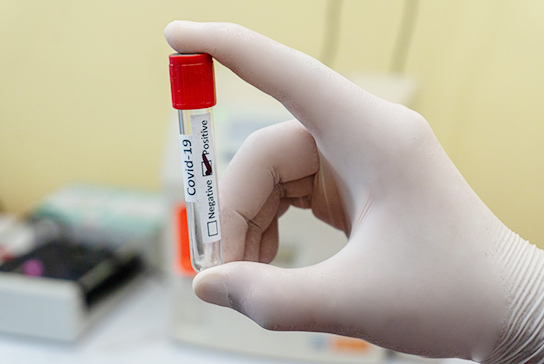Learn about available treatments if you get COVID-19.
COVID-19 Testing Guidelines and Resources
Updated Jan. 18, 2024
If you have COVID-19 symptoms and are waiting for a test or your results, stay home and isolate from others. Learn more about COVID-19 testing, rapid testing, and when you should get a test below.
Your health care provider can best advise you about the need to be tested for COVID-19. Testing is encouraged if you have COVID-19 symptoms or were recently exposed to someone who tested positive for the virus.
Test right away if you have symptoms of COVID-19.
If you have been exposed but do not have symptoms, wait to get tested until day 5 after your last exposure to someone with COVID-19, according to the CDC. (The day of exposure is day 0.) Testing before day 5 is likely to be too soon to indicate if you have developed, or will develop, an infection. During the five-day period, wear a well-fitting mask at all times if you must be around other people. If, after day 5, you test negative, you should continue to wear a well-fitting mask until day 10.
Health experts caution that COVID-19 tests only tell you what your status is for that exact moment in time. For example, you could have been exposed to the virus a few hours before testing but haven’t reached the viral level that can be detected by a COVID-19 test.
You can find a COVID-19 testing location near you through the state of California’s COVID-19 website.
You can view individual county testing resources as well:
- Sacramento County
- Placer County
- El Dorado County
- Yuba County
- Sutter County
- Other counties across California
UC Davis Health patients and non-patients with COVID-19 symptoms can contact a doctor through UC Davis Express Care or by contacting your primary care provider by phone or MyUCDavisHealth. A provider can help quickly coordinate a COVID-19 test, possibly at a UC Davis Health drive-up site in Sacramento.
You should get tested 5 days after your last close contact with someone with COVID-19. If you develop COVID-19 symptoms, test immediately. If you had confirmed COVID-19 infection within the past 30 days (you tested positive using a viral test), then there's no need for you to get tested unless you have symptoms.
You could test positive for COVID-19 for weeks to months after infection. The PCR tests generally stay positive longer than the antigen tests. Positive tests do not always indicate that you can spread COVID-19 to others and may not correlate with infectiousness.
A diagnostic test, known as a molecular PCR test, collects samples of cells and fluids from your respiratory system. It enables the identification of specific genes for the SARS-CoV-2 virus that causes COVID-19. The specimen is collected using a long nasal swab that is inserted into the passageway between the nose and the back of the throat. PCR tests, like the ones used by UC Davis Health's lab, are close to 100% accurate in diagnosing COVID-19 infection, but the disadvantage is they take a little more time for results.
Rapid antigen tests account for most of the rapid diagnostic tests. These are done with a nasal or throat swab and looks for a protein that’s part of the virus. Antigen tests are less expensive and have a generally quicker turnaround time, sometimes within 15 mins. However, they are less accurate because if a person is not near peak infection, but still contagious, the tests may come back negative.
An antibody test, also known as a serology test, is done with a blood sample that may identify past infection of the virus that causes COVID-19. It’s a test that looks for evidence of the body’s immune response to the virus. Antibodies are detected in the blood after an infection.
To determine which test you should take, know why you're being tested.
If a rapid test is more available or convenient, it's a good idea to use it. If it's positive for COVID-19, you can rely on the result.
With all home-use tests on the market, whether antigen or PCR, following testing instructions is very important to ensure the quality of testing. For example, if a swab isn't inserted deep enough into the nose, it may not collect a good sample for testing and may give a false negative.
UC Davis Health patients and non-patients with COVID-19 symptoms can contact a doctor through UC Davis Express Care or by contacting your primary care provider by phone or MyUCDavisHealth. A doctor can help quickly coordinate a COVID-19 test, possibly at a UC Davis Health drive-up site in Sacramento.
You can find information on free and low-cost tests on the state of California's website.
Rapid antigen tests search for protein pieces from the coronavirus. For COVID-19 testing, a sterile swab is used to collect samples from both nostrils. The swab is then combined with a liquid (a buffer).
Depending on the test, a swab is placed into a test cartridge, or the liquid is dripped onto the test cartridge itself. If enough protein pieces from the virus are present in the liquid, the test strip will turn positive during the testing time (usually 15 to 20 minutes). Because low levels of a virus may not be detected, it's recommended people test at least twice 48 hours apart to increase the odds of detecting an infection.
Read the manufacturer's instructions on the at-home COVID-19 test before using it. For an at-home test, you will likely insert a swab device into your nose and then test the specimen. Be sure to follow the maker's instructions or your test results may be inaccurate. Wash your hands before and after you collect a nasal specimen.
Antigen tests are known to be less sensitive than PCR tests. These COVID rapid tests perform best when people with high viral loads test within a few days after COVID-19 symptoms appear. In people who have no symptoms, the sensitivity is improved by repeat testing 48 hours apart.
It is important to follow the testing instructions that come with the test to ensure the quality of the results. For example, if a collection swab isn’t inserted deep enough into the nose or not swabbed the recommended number of times, it may not collect a good sample for testing. Then the test may give a false negative.
No test is completely accurate. This means that some cases will be missed (false negatives), and some people will be told they have COVID-19 when they don’t (false positives). Positive tests tend to be accurate. Negative tests need to be interpreted with caution. This is especially true in high-risk settings where there are people vulnerable to severe disease from COVID-19 (due to age or chronic medical conditions, etc.) or when the test is used on asymptomatic people. However, some experts argue that widespread testing, even when it's less accurate, can help contain COVID-19, especially if the test is regularly repeated.
You can buy an over-the-counter rapid antigen self-test kit for $20 to $30 online or at drugstores (although they sometimes sell out quickly). These at-home kits usually come with two tests, and you can use an app to track your results.
The Center for Medicare and Medicaid Services has set up a new program where people can get reimbursed for tests through their insurance company.
Get more information on how to get your rapid antigen test
The U.S. government is also providing free at-home COVID-19 rapid tests. The tests are delivered by USPS. Each order contains four individual tests. There is a limit of 1 order per household.
Order your rapid antigen test kit from the federal government
COVID-19 testing locations, which you can find through California’s COVID-19 website, offer different types of COVID-19 tests, including antigen and PCR tests.
UC Davis Health patients and non-patients with COVID-19 symptoms can contact a doctor through UC Davis Express Care or by contacting their primary care provider through MyUCDavisHealth.
If you were exposed to someone with COVID-19 and have symptoms but test negative on an at-home test, you should take a PCR test. These tests are more sensitive than the rapid at-home tests. You can also contact a physician to request PCR testing.
When to Contact Your Provider
If you have serious symptoms of illness, contact your primary care provider. UC Davis Health patients can use the MyUCDavisHealth symptom tracker to evaluate whether to seek help. Telehealth Express Care video visits are also available.
If you have a medical emergency, call 911 and notify them of your COVID-19 symptoms.
Ways to Seek Treatment
If you test positive for COVID-19 at home, you can contact your primary care provider about a prescription for Paxlovid.
UC Davis Health patients and non-patients can schedule a telehealth video visit with Express Care.
Visitor Policies
To help limit spread of COVID-19, we have policies for visits to our hospital and outpatient clinics.



